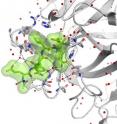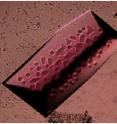Scientists make key step in the development of a norovirus treatment
With the number of norovirus infection cases rising across the country, scientists from the University of Southampton have successfully crystallised a key norovirus enzyme, which could help in the development of a norovirus treatment. Noroviruses are recognised world-wide as the most important cause of epidemic nonbacterial gastroenteritis (stomach bugs) and pose a significant public health burden, with an estimated one million cases per year in the UK. In the past, noroviruses have also been called 'winter vomiting viruses'.
By crystallising the key protease enzyme, the research team from the University has been able to design an inhibitor that interacts with the enzyme from the 'Southampton' norovirus. The inhibitor works by preventing the enzyme in the norovirus from working, stopping the spread of infection.
The virus is called the Southampton virus because this particular virus was first found in an outbreak that came from a family in Southampton. Traditionally, individual noroviruses are named after the place from which the virus was first found, so for example the very first norovirus is known as Norwalk virus because it discovered in Norwalk in Ohio, America.
University of Southampton virologist Professor Ian Clarke says:
"Noroviruses place a huge burden on the NHS. This is an important step forward in the rational design of new drugs to treat norovirus infections. Now we know the drug works in the test tube, the next step is to see whether we can modify and deliver it to the site where the virus grows."
The research team hopes to translate their laboratory findings into an antiviral treatment for norovirus infection.
Source: University of Southampton
Other sources
- Scientists make key step in the development of a norovirus treatmentfrom PhysorgTue, 1 Feb 2011, 17:02:20 UTC
- Key step in the development of a norovirus treatmentfrom Science DailyTue, 1 Feb 2011, 15:31:10 UTC

